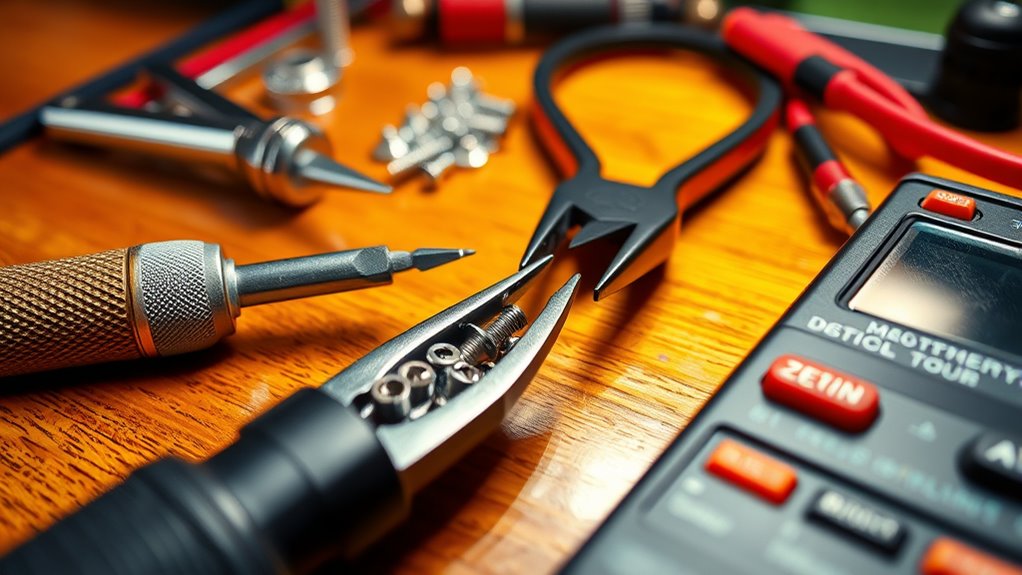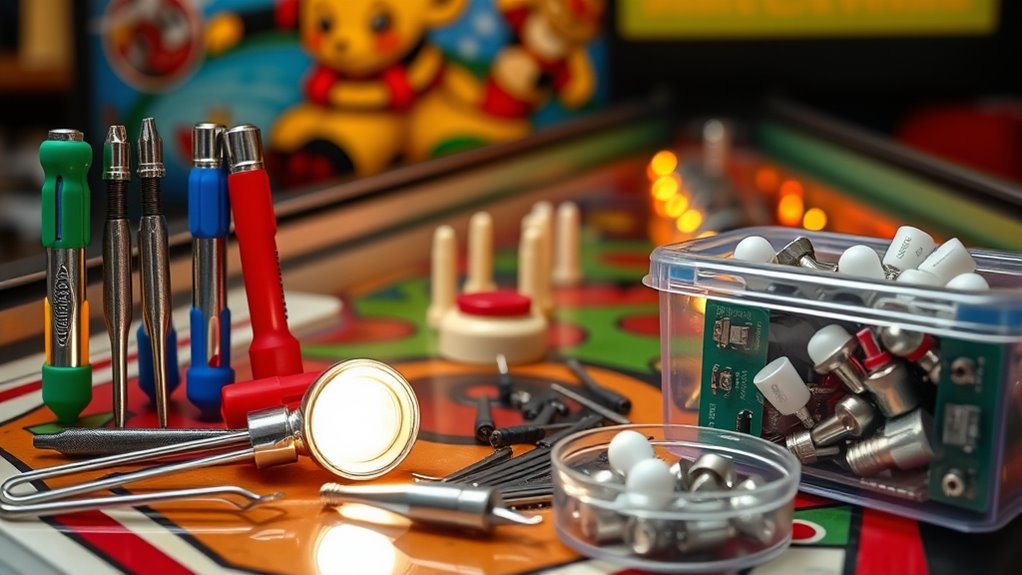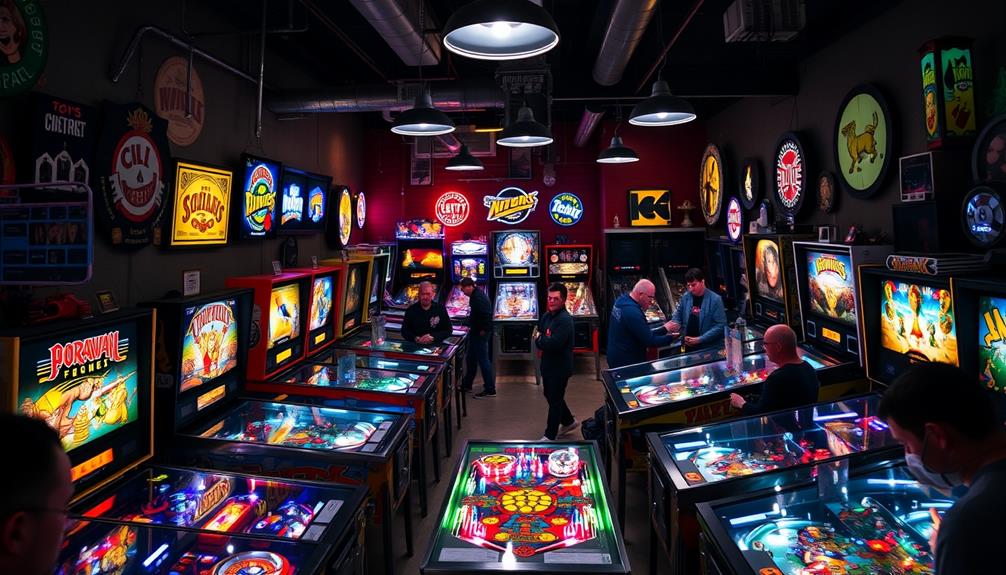To maintain your pinball machine, gather essential tools like screwdrivers (Phillips and flat-head), pliers, and a multimeter for circuits. Keep cleaning supplies such as soft cloths, non-abrasive cleaners, and a glass cleaner handy for regular maintenance. Consider specialized tools like flipper coil testers and precision screwdrivers to handle specific repairs. Investing in these basics will keep your machine in top shape, and you’ll discover more tips if you explore further.
Key Takeaways
- Screwdrivers (Phillips and flat-head) for panel removal and internal access.
- Multimeter for testing circuits, coils, and connections.
- Pliers and needle-nose tools for gripping wires and small parts.
- Cleaning supplies like soft cloths, non-abrasive cleaners, and brushes for maintenance.
- Precision screwdrivers and specialized tools for detailed repairs and adjustments.
Basic Hand Tools for Pinball Repair

To keep your pinball machine in top shape, having a reliable set of basic hand tools is essential. These tools help you adjust spring tension, ensuring flippers and bumpers respond correctly. A good set of screwdrivers, including Phillips and flat-head, allows you to remove panels and access internal components easily. Pliers and needle-nose tools are handy for gripping wires or small parts during repairs. A multimeter is vital for circuit testing; it helps identify faulty coils, switches, or connections. Regularly inspecting and maintaining sound vibration components can enhance your machine’s overall performance and longevity. With these tools, you can troubleshoot electrical issues efficiently and fine-tune mechanical parts. Properly maintaining spring tension and testing circuits prevent future problems and prolong your machine’s lifespan. Always keep your tools organized for quick, effective repairs whenever needed.
Cleaning Supplies and Maintenance Products

Keeping your pinball machine clean is essential for smooth operation and longevity. Using proper cleaning supplies and maintenance products helps prevent dirt buildup and mechanical issues. Develop a regular maintenance schedule to ensure consistent performance. For cleaning techniques, use soft cloths and non-abrasive cleaners to avoid damaging surfaces. Essential supplies include glass cleaner, silicone spray, and cotton swabs for tight spots. Here’s a quick guide:
| Supply | Purpose | Frequency |
|---|---|---|
| Glass cleaner | Cleans playfield glass | Weekly |
| Silicone spray | Lubricates moving parts | Monthly |
| Microfiber cloth | Wipes surfaces | After each play |
| Cotton swabs | Clean tight spots | As needed |
| Cleaning brushes | Remove dust and debris | Monthly |
Stay consistent with cleaning techniques and schedules for a smooth, trouble-free game.
Specialized Pinball Tools and Accessories

Having the right specialized tools and accessories makes maintaining and repairing your pinball machine much easier. Flipper coil testers help you quickly identify coil issues without guesswork, saving you time and preventing unnecessary parts replacement. Playfield protectors are essential for preserving your machine’s surface, especially during repairs or adjustments, preventing scratches and wear. Other useful tools include precision screwdrivers, plunger pullers, and wire strippers, which allow you to perform detailed repairs efficiently. Investing in quality accessories ensures your maintenance tasks are safer and more effective. These specialized tools streamline common repairs, extend your machine’s lifespan, and keep it looking and functioning at its best. With the right accessories, you’ll handle upkeep with confidence and ease. Understanding fan culture can also enhance your appreciation of pinball’s community and history, enriching your overall experience.
Frequently Asked Questions
How Often Should I Perform Basic Pinball Maintenance?
You should perform basic pinball maintenance regularly to keep your game in top shape. Aim for routine cleaning and component inspection every few months, or more often if you play frequently. Checking for dust, dirt, and wear helps prevent issues. Regularly inspecting parts like bumpers, coils, and switches guarantees everything functions smoothly. Staying consistent with these maintenance tasks keeps your pinball machine reliable and extends its lifespan.
Are There Specific Brands Recommended for Pinball Tools?
Imagine you’re back in the 80s at a pinball arcade, wielding your trusty flipper. When it comes to brand recommendations, you want tools known for their durability and precision. Brands like Wico and Titan are popular for their sturdy construction, ensuring your tools last through many repairs. Investing in quality tools from reputable brands makes maintenance smoother and keeps your pinball machine in top shape, just like those arcade legends.
Can I Repair My Pinball Machine Without Professional Help?
You can definitely tackle DIY repairs on your pinball machine if you’re comfortable with basic electronics and mechanical work. Just make certain you have the right tools that are compatible with your machine to avoid damage. Start with simple fixes, and if you encounter complex issues, don’t hesitate to seek professional help. Proper tool compatibility and patience will help you maintain and repair your pinball machine effectively.
What Safety Precautions Should I Take During Maintenance?
When maintaining your pinball machine, you should prioritize electrical safety by unplugging it before starting any work. Always follow cleaning precautions to avoid damaging components or causing injury. Wear gloves if necessary, and keep liquids away from electronic parts. Inspect cords and connections for wear or damage, and handle all parts carefully. Taking these safety measures helps prevent accidents and guarantees your pinball machine remains in good working condition.
How Do I Diagnose Common Pinball Machine Issues?
When diagnosing common pinball machine issues, you’re really on a treasure hunt. Use troubleshooting techniques like checking for loose wires, faulty switches, or bad connections. Diagnostic tools, such as multimeters and test lamps, become your best friends here. Start by observing the game’s behavior, then systematically test components. Think of it as piecing together a puzzle, and soon enough, you’ll pinpoint what’s causing the trouble and fix it efficiently.
Conclusion
Just like a skilled conductor keeps an orchestra in harmony, your toolbox guarantees your pinball machine plays flawlessly. With the right basic tools, cleaning supplies, and specialized accessories, you’re equipped to handle minor repairs and maintenance with confidence. Think of your efforts as tending a garden—each tool like a gardener’s instrument helps your machine flourish. Keep these essentials close, and your pinball machine will continue to provide thrilling gameplay for years to come.









